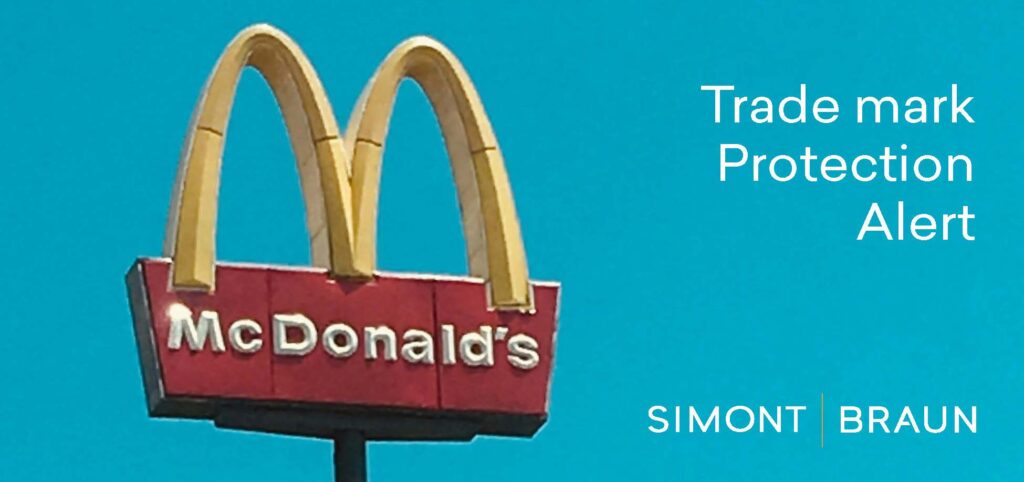McDonald’s loses its EU trade mark ‘Big Mac’ for chicken products – an important reminder for owners of (famous) brands
McDonald’s has lost its EU trade mark ‘Big Mac’ for chicken sandwiches and poultry products in classes 29 and 30 and related restaurant services in class 42 after five years of non-use, following a judgment of the General Court of the EU of 5 June 2024 (T-58/23). This case illustrates that even major players with famous trademarks must carefully prove genuine use of their trademarks for the goods and services they protect.
DISPUTE AND CONTEXT
McDonald’s, the famous American fast food chain, has been involved in a dispute with Supermac’s, an Irish fast food chain known for its fish and chips and burgers, over the EU trademark ‘Big Mac’. The trademark had been registered by McDonald’s for more than 20 years for, inter alia, meat and poultry products and services provided in restaurants.
In 2017, Supermac’s filed an application for revocation of the ‘Big Mac’ trademark in relation to certain goods and services. Supermac’s, which opened its first restaurant in Galway in 1978 and has sought to expand in the UK and Europe, sought to restrict the McDonald’s trademark in the EU. It claimed that the ‘Big Mac’ trademark had not been put to genuine use in the EU in connection with those goods and services for a continuous period of five years.
An EU trade mark can be revoked at the request of a third party if, within a continuous period of five years, it has not been put to genuine use in the European Union in connection with the goods or services for which it is registered. Therefore, if a trademark is challenged for lack of use, the trademark owner must prove the place, time, extent and nature of the use of the trademark in relation to the goods and services for which it is registered.
The European Union Intellectual Property Office (EUIPO) partially upheld Supermac’s application and revoked the ‘Big Mac’ trademark in respect of certain goods and services (including preserved and cooked fruits and vegetables, eggs, cheese, milk, pickles, desserts, biscuits, bread, chocolate, coffee, mustard, restaurant design and construction consulting for others, etc.), but confirmed the ‘Big Mac’ trademark registration in respect of, inter alia, foods prepared from meat and poultry products and meat and chicken sandwiches, as well as restaurant services and drive-through facilities.
JUDGMENT OF THE GENERAL COURT
Following an appeal by Supermac’s, the General Court rejected McDonald’s arguments and partially annulled and amended the EUIPO decision, thereby further limiting the protection of McDonald’s ‘Big Mac’ trademark.
The General Court found that McDonald’s had failed to prove genuine use of its ‘Big Mac’ trademark in relation to ‘chicken sandwiches’, ‘foods prepared from poultry products’, and ‘services rendered or associated with operating restaurants and other establishments or facilities engaged in providing food and drink prepared for consumption and for drive-through facilities; preparation of carry-out (“drive-in”) foods’.
According to the General Court, the evidence submitted by McDonald’s did not indicate the extent of the use of the ‘Big Mac’ trademark in relation to those goods and services, in particular as regards the volume of sales, the length of time during which the trademark was used and the frequency of use.
CONCLUSIONS AND LESSONS LEARNED
This judgment serves as a useful reminder to brand owners, and shows that even major players with famous marks cannot simply rely on the assertion that their mark is well known to the public and therefore inevitably used. They must also provide sufficient and concrete evidence of genuine use of their marks for the goods and services they protect.
Therefore, care should be taken to apply for and register a mark only for those goods or services for which it is used or intended to be used. In particular, before applying for registration of a mark, the trade mark applicant should consider whether the mark will be used only for a particular end product or for particular sub-categories of products.
As a defendant, it may be worth challenging the validity of even a world-famous mark, as they are subject to the same strict examination of proof of genuine use as any other mark older than five years.
And McDonald’s? Not all is lost for them, because they retain their ‘Big Mac’ trademark for meat products and will still be able to act on that basis against the use of their trademark for similar (chicken) products and complementary (restaurant) services.
For any questions or assistance, please reach out to our
Intellectual Property Team | IP@simontbraun.eu – +32 (0)2 543 70 80
***
This newsletter is not a legal advice or a legal opinion. You should seek advice from a legal counsel of your choice before acting upon any of the information in this newsletter.

